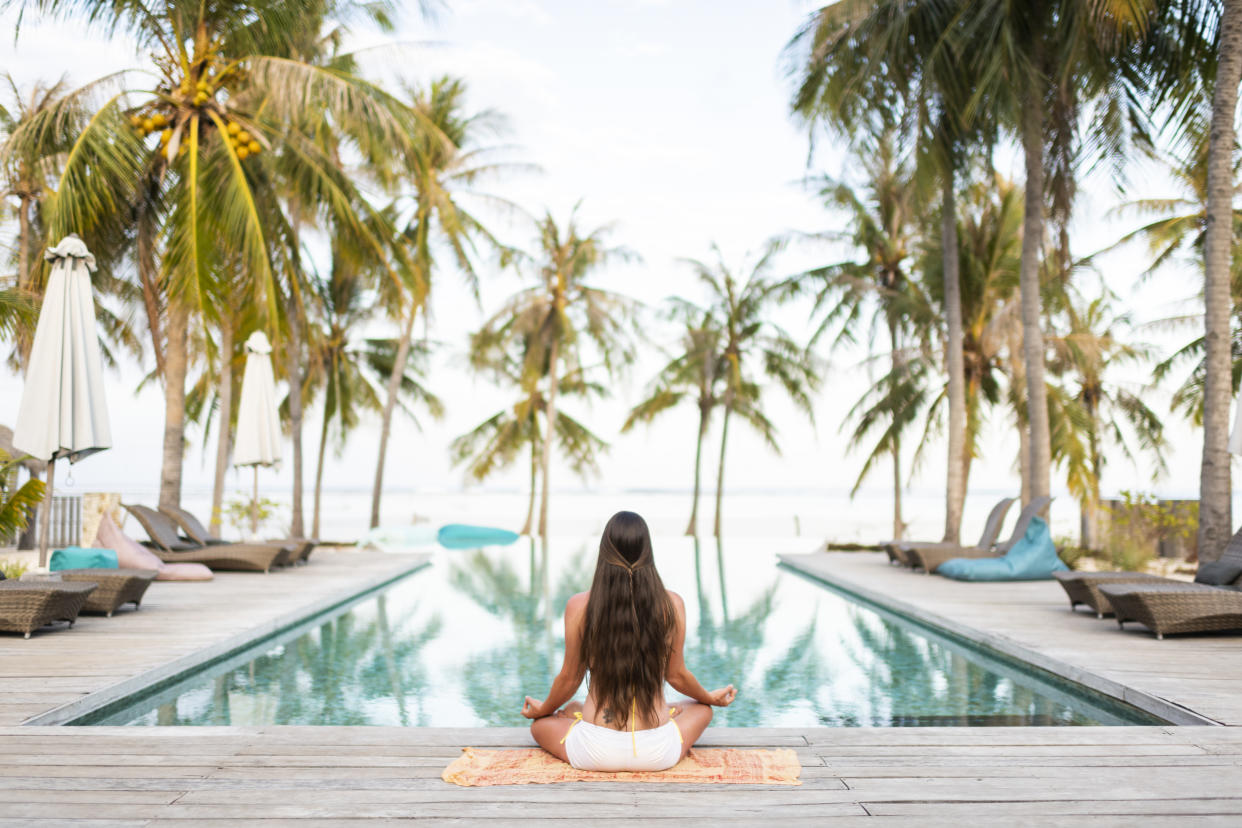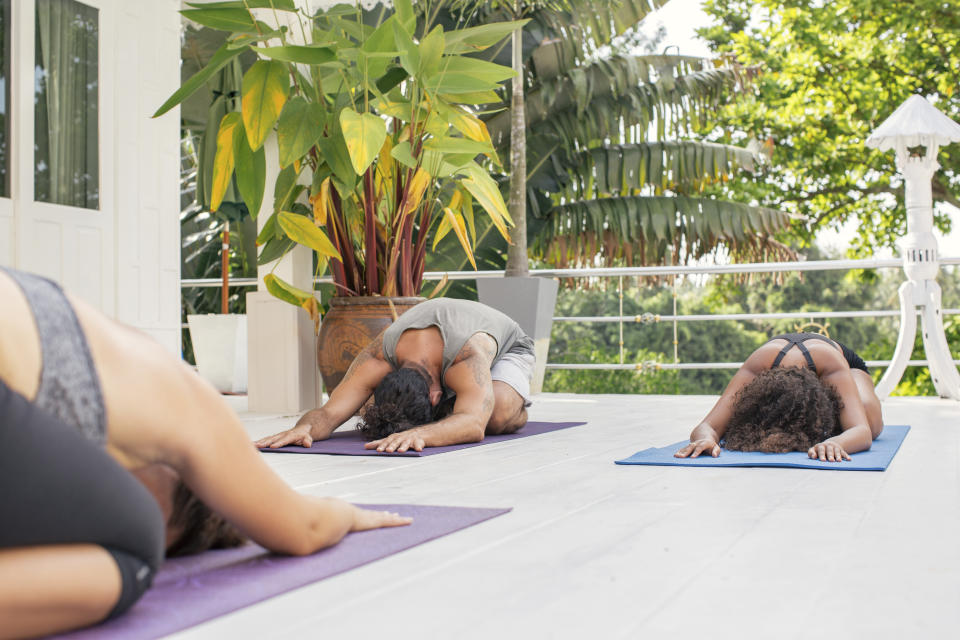How the coronavirus pandemic has 'decimated' the wellness tourism industry

To counterbalance quarantine life, there is a higher premium than ever on “wellness” — the quest for mental and physical enlightenment — but during the coronavirus pandemic, showering or deep breathing counts. And while there are virtual hikes, yoga and meditation to keep people sane, wellness resorts and retreats, which offer physical and often-opulent respite, have gone dark as travel halts and the need for bare necessities deepens.
Wellness tourism, an estimated $919 billion industry by 2022, is hurting. “I do not have any data on how much wellness tourism is hurt by coronavirus, but like all travel, it’s decimated,” Beth McGroarty, vice president and director of research and PR at the Global Wellness Institute, tells Yahoo Life, adding that 830 million wellness trips were taken in 2017 (691 million more since 2015, for comparison).
There are only eight confirmed coronavirus cases in Watauga County, N.C., as of April 21, but the Art of Living Retreat Center in the Blue Ridge Mountains shut down on March 13, a precaution that led to a $1 million loss in business, according to Kimberly Rossi, director of business development. “There has been a significant financial impact,” Rossi tells Yahoo Life, adding that approximately 2,000 guests were refunded or rescheduled, and a 500-attendee holistic medical convention was canceled.
The center quickly took its signature programs online: a $495 Happiness Retreat centered on a calming breathing technique was reduced to $190 online for the month of April, an onsite cleanse to “reset the digestive system” was pared down to self-massage and a simple diet and video tutorials on “Alternate Nostril Breathing,” and healthy recipes were made available.
“The idea is to have a dedicated presence and deliver a product which is better than nothing but also not the full experience,” says Rossi. Business is closed until at least April 30, and May reservations are in limbo, although Rossi says people are rebooking for later dates. Going forward, the center will eradicate communal yoga blankets and mats and ask guests to bring their own or purchase upon arrival.

BodyHoliday in St. Lucia, which promises “Give us your body for a week and we’ll give you back your mind,” closed on March 20, temporarily laid off 400 employees and waived guest cancellation fees, but the all-inclusive luxury resort is already planning for a post-COVID-19 future.
“When our guests come out of isolation, how can we make them feel cared for?” executive director Andrew Barnard tells Yahoo Life. The property, set to reopen on June 1, plans to provide hospital-grade bed linens, a simplified restaurant menu to reduce “stress triggers” associated with choice overload and full transparency of its hygienic protocol.
In Quebec City, Canada, employees at the Le Monastère des Augustine wellness spa and hotel would typically be administering massages and leading qigong classes, but since the pandemic, the hospital founded by French Augustinian nuns is temporarily on a new mission.
Since closing on March 12, the historic property is now a free shelter for parents of sick or terminally ill children with cancer. Director Isabelle Duchesnewau changed course after a flood of guest cancellations and learning from a local hospital that parents — some of whom who traveled long distances for medical care — had nowhere to sleep during their children’s treatments.
“We have about 10 parents at the center, but there is room for 32,” Duchesnewau tells Yahoo Life. “They can stay for as long as they need.” The center is also looking for ways to help first responders, who Duchesnewau calls “angels,” to ease the mental strain of the coronavirus and honor the center’s legacy. “Even without spa services and the restaurant,” she says, “this is pure wellness.”
And guests of Sensei Lana’i, a Four Seasons Resort in Hawaii cannot enjoy thermal body mapping, aqua-therapy and Lomi Lomi massage right now, but some staff partake of virtual yoga, fitness and meditation classes on Zoom. The well-being retreat is also providing food grown at Sensei Farms (normally used at the resort’s restaurant Sensei by Nobu) to employees and local residents in need. “In our high-touch spa and wellness retreats business, we will need to respond to a market that has been forced to touch less,” Sensei CEO Kevin Kelly tells Yahoo Life. “So, Sensei will need to develop new protocols and rely more heavily on science and technology to make adjustments to our wellness programming.”
Eight customers who signed up for a seven-night March getaway to Beyond: Yoga Retreat in Puerto Vallarta, Mexico, through Revive Restorative Retreats chose to reschedule for a future date (a concession made by Beyond: Yoga Retreat in light of COVID-19, a resort spokesperson tells Yahoo Life), while nine others cautiously embarked on the trip paying anywhere from $1,100 to $2,500 to practice Bodyart and MELT Method training.
According to the organizers, at the time of the March 14 trip, there were no reported coronavirus cases in the immediate region. Yahoo Life was not immediately able to verify the number of cases in Puerto Vallarta at that time, although Mexico confirmed its first two cases on Feb. 27.
As of the morning of April 21, Mexico had 8,772 reported COVID-19 cases and 712 deaths, according to the Johns Hopkins University Coronavirus Resource Center. But Mexico’s Deputy Health Minister Hugo Lopez-Gatell had estimated on April 8 that the pandemic’s impact may be “eight times bigger.”
“It was this weird time of enjoying a tropical paradise while trying to monitor the virus,” co-founder Marisa Merliss of New York tells Yahoo Life. After returning home, adds co-founder Becca Pace, some were judged by family members for “selfishly” taking the excursion.
It’s too soon to know whether the company’s November trip to Ubud, Bali, will happen; the pandemic hit before Revive could start advertising, so the women are teaching donation-based online fitness classes, while Merliss, a registered nurse, works two shifts per month at NewYork-Presbyterian Hospital. Revive canceled local “mini-retreats” in April and May but is considering a multi-day “virtual retreat” and a possible pandemic contingency plan if the coronavirus turns seasonal, as speculated by some experts.
However, there is hope for recovery. “I am being cautiously optimistic that when we all begin traveling again, our personal health and safety will be top of mind, and that wellness travel will be one of the first sectors of the tourism industry to recover,” Anne Dimon, the president of the Wellness Tourism Association tells Yahoo Life.
McGroarty says, “People are fantasizing about their wellness travels post-virus lockdown all over social media. As travel opens up again, wellness tourism should do especially well.” She adds that remote destinations designed for social distancing and the anticipation of nature and fresh air is encouraging.
“When people feel comfortable getting on a plane and sitting next to a stranger, we’ll see a gradual rebuilding of the travel industry,” says Barnard. “The wellness industry is well-poised because people will need it more than ever. But it will be a slow climb.”
For the latest coronavirus news and updates, follow along at https://news.yahoo.com/coronavirus. According to experts, people over 60 and those who are immunocompromised continue to be the most at risk. If you have questions, please reference the CDC’s and WHO’s resource guides.
How to maintain your physical and mental health during the pandemic
Taking care of a loved one with COVID-19? Here’s how to stay healthy
Q&A with Dr. Kavita Patel: How to keep your family safe and maintain your mental health
Read more from Yahoo Life:
Advice on raising kids during coronavirus: Be ‘The World’s Okayest Mom’
Need a therapist? Here's how to find one during the coronavirus outbreak
Mailman delivers essential items to quarantined neighbors: ‘I’m doing this to keep people inside’
Want daily wellness, lifestyle and parenting news delivered to your inbox? Sign up here for Yahoo Life’s newsletter.


